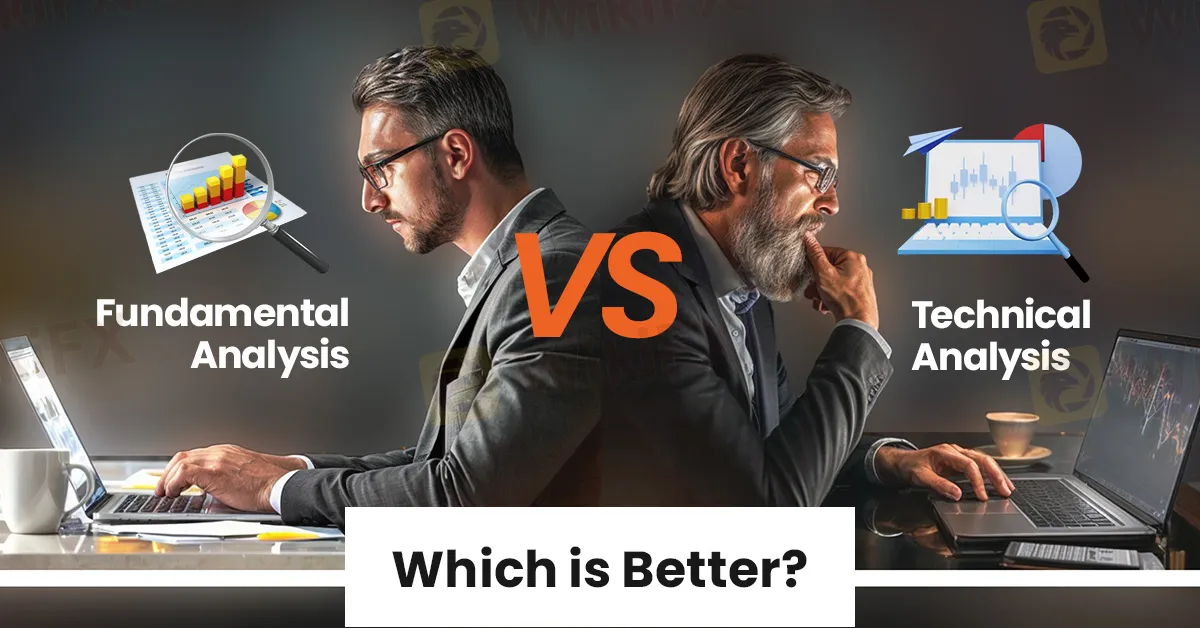简体中文
繁體中文
English
Pусский
日本語
ภาษาไทย
Tiếng Việt
Bahasa Indonesia
Español
हिन्दी
Filippiiniläinen
Français
Deutsch
Português
Türkçe
한국어
العربية
Fundamental VS Technical Analysis - Which is Better?
Abstract:Discover the ultimate trading secret: the battle between fundamental and technical analysis unveiled.

In the world of forex and cryptocurrency trading, there exists an ongoing debate between two major schools of thought: fundamental analysis and technical analysis. Both methodologies offer unique perspectives on market behaviour and can be powerful tools in the hands of skilled traders. However, the question remains: which approach is better?
Fundamental analysis revolves around the examination of economic, social, and political factors that may influence the value of a currency or cryptocurrency. This includes assessing factors such as interest rates, inflation, geopolitical events, and economic indicators like GDP growth and employment figures. Proponents of fundamental analysis argue that these fundamental factors ultimately drive long-term trends in the market.
On the other hand, technical analysis focuses on the study of historical price and volume data to identify patterns and trends. Technical analysts use tools such as charts, trendlines, and indicators like moving averages and relative strength index (RSI) to make trading decisions. They believe that past price movements can provide insights into future price action and market sentiment.
So, which approach is better?

The truth is, there is no one-size-fits-all answer. Both fundamental and technical analysis have their strengths and weaknesses, and successful traders often use a combination of both methodologies to inform their decisions.
Fundamental analysis is particularly useful for long-term investors who are interested in understanding the underlying value of an asset. For example, in the forex market, central bank policies and economic data releases can have a significant impact on currency valuations over time. Similarly, in the cryptocurrency market, developments such as regulatory changes or technological advancements can drive long-term price trends.
However, fundamental analysis may not always be timely in a fast-moving market. Economic data releases can be unpredictable, and their impact on the market may be delayed or muted by other factors. Moreover, fundamental analysis can sometimes be subjective, as different analysts may interpret the same data differently.
On the other hand, technical analysis excels in identifying short-term trading opportunities and timing market entries and exits. Technical indicators can help traders spot trends, reversals, and support and resistance levels, allowing them to make informed decisions based on price action. Technical analysis also tends to be more objective, as price data is readily available and can be analysed using standardized tools and techniques.
However, critics argue that technical analysis alone may not provide a complete picture of market dynamics. Price movements are influenced by a wide range of factors, and technical indicators can sometimes generate false signals or fail in volatile market conditions.
Ultimately, the effectiveness of fundamental versus technical analysis depends on the individual trader's preferences, time horizon, and risk tolerance. Some traders may prefer to focus exclusively on one approach, while others may use a combination of both. Whichever path you choose, it's essential to continuously educate yourself, adapt to changing market conditions, and practice proper risk management techniques. After all, successful trading is not about finding the “better” approach but rather about finding what works best for you.

Disclaimer:
The views in this article only represent the author's personal views, and do not constitute investment advice on this platform. This platform does not guarantee the accuracy, completeness and timeliness of the information in the article, and will not be liable for any loss caused by the use of or reliance on the information in the article.
Read more

President of Liberland Vít Jedlička Confirms Attendance at WikiEXPO Hong Kong 2025
Vít Jedlička, President and Founder of the Free Republic of Liberland, has confirmed his participation in WikiEXPO Hong Kong 2025, one of the most influential Fintech summits in the industry. The event will bring together global leaders, innovators, and policymakers to delve into the future convergence of technology and society.

Is Billion Bucks Fx Scam?
Recent claims on YouTube and social media platforms allege that Billion Bucks Fx is a scam broker. Many traders have reportedly lost money after investing with this broker, and it has been given a notably low score of 1.06/10 by independent rating platforms. In this article, we break down the details of Billion Bucks Fx, assess the risks, and provide insight into whether investors should be wary of its services.

SocialFi and the Forex Market: A New Era for Decentralized Social Trading?
The worlds of social media and decentralized finance (DeFi) have converged under a new banner—SocialFi. Short for “Social Finance,” SocialFi leverages blockchain technology to reward user engagement, giving individuals direct control over their data and interactions. While SocialFi has primarily emerged in the context of content creation and crypto communities, its principles could soon revolutionize the forex market by reshaping how traders share insights and monetize social influence.

Do This ONE Thing to Transform Your Trading Performance Forever
The story is all too familiar. You start trading with high hopes, make some quick profits, and feel like you've finally cracked the code. But then, just as fast as your gains came, they disappear. Your account balance dwindles, and soon you’re left wondering what went wrong. Worse still, fear and confusion creep in, making every new trade a stressful gamble rather than a calculated decision. If this cycle sounds familiar, you’re not alone.
WikiFX Broker
Latest News
Forex Market Outlook: Key Currency Pairs and Trading Strategies for March 24–28, 2025
Singapore Police Crack Down on Scams: $1.9M Seized, 25 Arrested
Gold Prices Swing Near Record Highs
XTB Opens New Dubai Office
The Growing Threat of Fake Emails and Phishing Scams
Africa Cybercrime Bust: Over 300 Arrested in Fraud Crackdown
Hong Kong Banks and Authorities Collaborate to Freeze Fraudulent Accounts Faster
SocialFi and the Forex Market: A New Era for Decentralized Social Trading?
Is Billion Bucks Fx Scam?
BaFin Halts USDe Token Issuance, Citing Serious Compliance Failures
Currency Calculator







